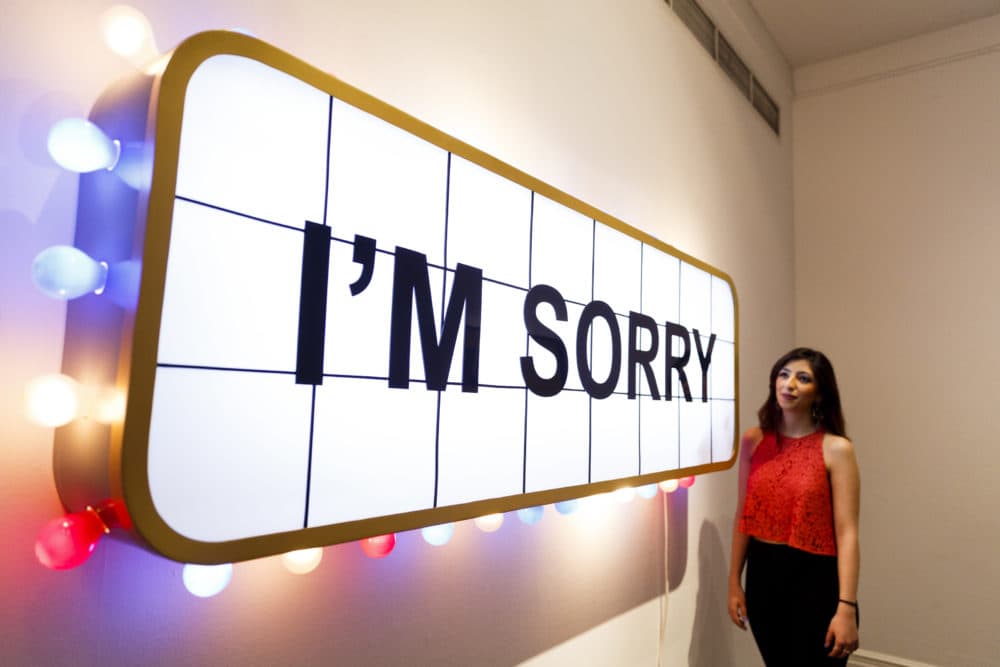Advertisement
Commentary
How To Apologize During A Pandemic — And Beyond

Never before have I seen so much depression and anxiety in my psychotherapy practice, fueled by the pandemic and the political climate. The risk of spreading a deadly virus has necessitated a reckoning of who we trust. Families are fractured over political beliefs.
In addition, people are living in closer quarters and interacting with fewer people during the pandemic, which has shone a spotlight on relationships in new ways. As our worlds have gotten smaller, there are fewer distractions to help paper over grievances. These changes call for greater skill managing the hurts and offenses that are part of daily living.
Recently, a male patient reported how angry he was that his roommate broke something of his that he values. “Ordinarily,” he said, “I would just stay out of the apartment for a few nights, avoid him and let it blow over, but now we are together 24/7 and I am just seething.” We spent the session examining how he could productively talk to his roommate about the incident and request an apology.
The need for apologies at this moment in our world is a pandemic unto itself, as leaders have failed to apologize for missteps and wrongdoing. This failure perpetuates a culture in which the loudest person in the room wins and parents are left to explain to their children why they need to behave better than the adults around them.
The need for apologies at this moment in our world is a pandemic unto itself ...
Whether it is love of country or our neighbor or our spouse, relationships depend on our ability to make amends in a consequential way. But learning how to apologize in a meaningful way is hindered by our cultural messaging that divulging hurt is to show weakness, and admitting to wrongdoing is tantamount to failure. No one wants to give in first and risk losing the upper hand. Gender and racial norms significantly influence this behavior as well.
The ingredients of an effective apology are empathy, timing, and a genuine, ongoing effort to change behavior. When apologies are demanded or given in a pro forma manner, they lack the authenticity required to bring about true healing. Learning to offer heartfelt apologies increases the likelihood of them being well received and being extended one in return.
One couple I see in my practice has been under tremendous strain during the pandemic as a result of loss of employment and having children learning at home remotely. The accumulated hurts are many and on both sides. It is unclear whether the marriage will survive, but together we are working toward developing a greater understanding of how they hurt each other and how they might change. The skills they are learning will help them and their children whatever happens in the future.
Advertisement
The power of an apology is grounded in empathy. But before we offer an apology it is crucial to understand exactly how we hurt the other person. It is easy to become defensive and explain away our behavior. Endless rounds of “you started it,” only serve to obfuscate the injury and undermine any attempt at apologizing. If we chastise someone by saying, “I said I was sorry,” we belie the fact that we are truly remorseful. Fear of conflict also hinders people’s willingness to offer an empathic response. Too often when I ask my patients if they spoke directly to the person who offended them, I’m told “I could never do that!” Instead, the person withdraws and the relationship suffers.
The timing of an apology is no less important than empathy. A well-timed apology allows for a response from the offended party. In contrast, a preemptive apology, made running in the door half an hour late and saying, “Sorry,” may fall short of repairing the hurt of leaving someone waiting. Text messages, so frequently used in this irresponsible way, have the same outcome. If we pressure people into accepting an apology, it can feel ingenuine.
When apologies are nonexistent or late in coming, the injury can fester. Many of my patients struggle to let go of early hurts because no one listened to them and they were forced to accept ill-timed apologies.
There is no vaccine for hurting each other. Words matter. Behavior matters. Change is not easy.
“Grow up,” “move on” and “shake hands” are much more common instructions for children in our society than “sit down and tell me how I hurt you.” There is a false sense of closure if we are not allowed to voice our feelings. Consequently, as adults they have little faith in the power of apologies. During the pandemic, many families are once again having family dinners due to the lack of sports and other evening activities. I’ve been encouraging them to use this opportunity to have family meetings and learn how to air grievances productively.
Changing behavior supports the genuineness of an apology. Actions do speak louder than words, but they don’t replace them. Both are important. When we hurt someone but don’t change our behavior, we chip away at the foundation of trust in the relationship. Over time, the words feel hollow and hope for change wanes. If I apologize for leaving dirty dishes in the sink today, then I must follow up my words by not leaving dirty dishes in the sink tomorrow.
There is no vaccine for hurting each other. Words matter. Behavior matters. Change is not easy. But as long as we live in a culture that promotes “standing your ground” rather than genuine expressions of apology we are destined to live in a world characterized by divisiveness. While we demand change in the public discourse, we can also practice the power of giving and receiving apologies in our personal lives, and reduce the amount of hurt in the world.
